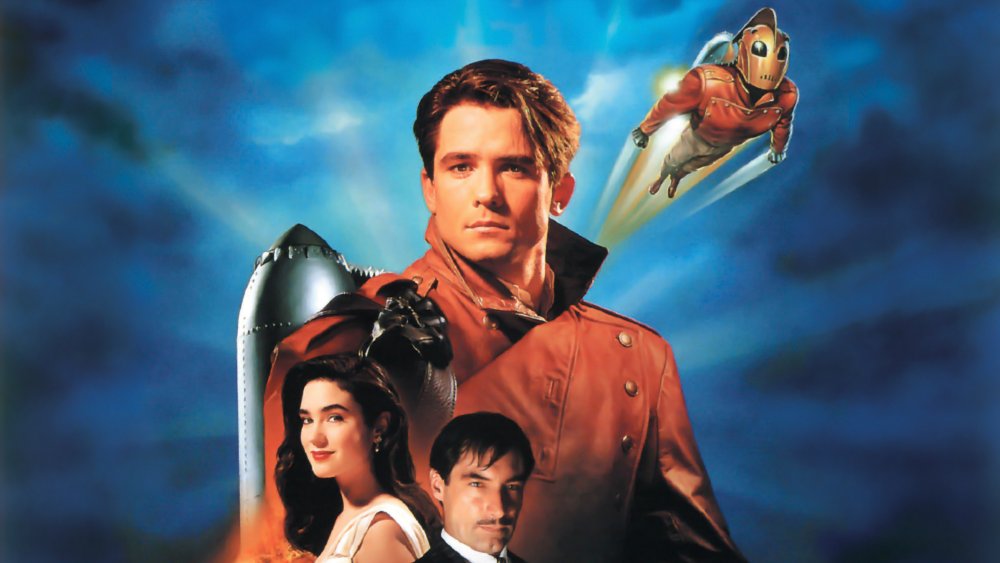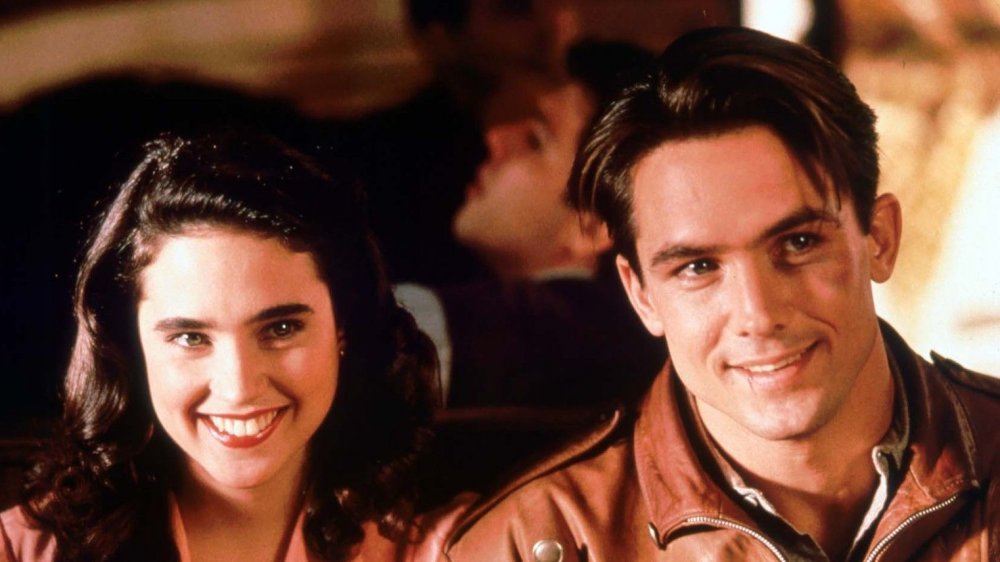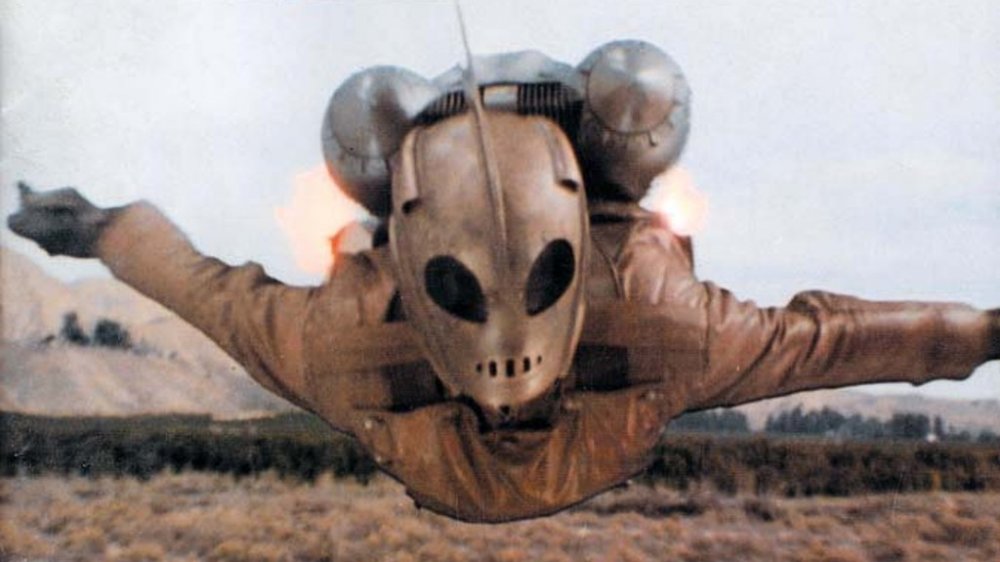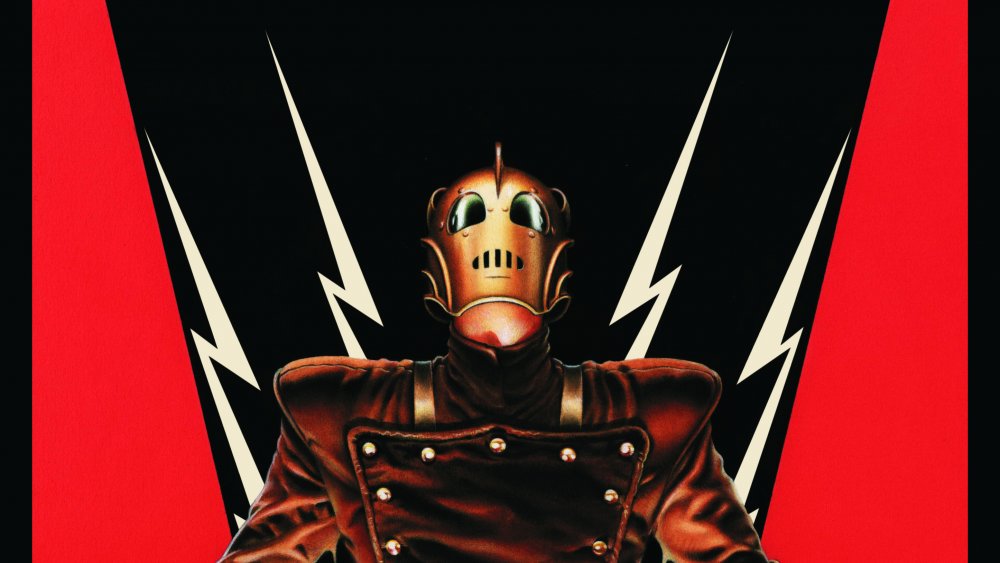The Real Reason The Rocketeer Never Got A Sequel
When Disney's superhero period piece The Rocketeer soared into theaters in 1991, it was poised to launch one truly high-flying trilogy. Based on an early '80s comic series from writer and artist Dave Stevens, the action-adventure and its rocket-powered hero was a spirited and affectionate homage to the sort of Saturday movie serials that graced theater screens and TV airwaves from the 1930s to 1950s.
In the film, Cliff Secord (Bill Campbell) is a cocky stunt pilot who stumbles upon a rocket pack stolen from Howard Hughes. After deciding to don the rocket and a flashy helmet, Cliff uses his newly created alter ego to save the day from a band of Nazis who want his jetpack as a weapon. Dynasty star Campbell was early in his career when he landed the lead role over A-listers like Dennis Quaid, Kurt Russell, and Bill Paxton. The rest of the cast was full of familiar names, including Jennifer Connelly, Alan Arkin, Timothy Dalton, Terry O'Quinn, and Ed Lauter.
Film rights to Stevens' tale of a stunt pilot turned superhero was purchased soon after its first issues were released, with Stevens eventually handing over the rights to two writers he trusted for free. Following several years of script rewrites, a director swap, and a studio change, one of Hollywood's earliest non-DC or Marvel superheroes seemed poised to leave his mark on '90s cinema with a franchise. Since its original release, the movie has built a cult following, but its planned sequels failed to materialize. So whatever happened to the would-be trilogy?
Despite being backed by the Mouse House and boasting several recognizable Hollywood names, The Rocketeer's complicated development process, coupled with its box office performance, helped seal its fate as a superhero standalone.
Disney turned Stevens adult tale into a family-friendly adventure for toy sales
Just a few years after the hero's first appearance, Stevens placed the Rocketeer in the hands of screenwriters Danny Bilson and Paul De Meo. They and Stevens had initially conceived a "fun and quirky" low-budget black and white movie, but once Angels in the Outfield director William Dear got attached, that concept morphed into a bigger budget studio feature (via TwoMorrows Magazine).
With Stevens' blessing, the team pitched the film around before inking a deal with Touchstone Pictures. The agreement allowed Bilson and De Meo room to conceive at least two more Rocketeer movies, which Stevens said the duo were working towards before then-Disney Chairman Jeffrey Katzenberg stepped in. After the title was shifted to Touchstone's parent company, Walt Disney Pictures, a failed bid to modernize the script instead saw the studio strip away its most adult elements. That includes the comics' female lead, Betty, a nude model in Stevens' work inspired by Bettie Page.
"As soon as we all signed on, Katzenberg pulled a switch and said, 'Nope, it's going to be a Disney release, because Disney needs a live-action hit,'" Stevens told TwoMorrows Magazine. "So immediately, Betty and anything else 'adult' went right out with the bathwater. They really tried to shoehorn it into a kiddie property so they could sell toys."
Despite this, the film had a notable and talented crew behind it, including George Lucas' Industrial Light & Magic studio, with Ken Ralston (Who Framed Roger Rabbit, Star Wars: Return of the Jedi) serving as the VFX supervisor. Directing duties eventually landed in the hands of effects artist and Honey, I Shrunk the Kids helmer Joe Johnston. At one point, Disney even approved a budget increase of $10 million. "We agreed on $25 million, but once [Disney] started seeing footage, they realized this was a bigger movie than they were anticipating, and they approved overages," Johnston told Entertainment Weekly in 1991.
Disappointing box office and studio tension stalled a Rocketeer sequel
Katzenberg's interest in toy sales may have resulted in a movie made for the wrong audience. Opening the same weekend as Terminator 2, The Rocketeer only earned $46.7 million at the box office on a budget of $35 million — not nearly enough to be considered a success after marketing costs. A box office bomb with a mixed critical response, the studio abandoned plans for more of its family-friendly superhero movie.
"When the film didn't perform in the first couple of weeks like they'd anticipated it should, they lost faith in it, and just blew out all that merchandise to the Midwest," Stevens recalled. "A lot of it was never even seen on the East or West coasts. It ended up in places like Pick' n' Save and 99¢ stores."
The box office and lack of toy sales certainly contributed to the decision to abandon plans for any Rocketeer follow-ups. However, a 2008 interview with the movie's star Bill Campbell also revealed that tensions between the director and studio might have been partly to blame.
"I was talking to Dave Stevens just the night before last. We always talked about having a sequel," Campbell told MTV News. "The movie didn't make as much money as Disney had hoped and that coupled with the acrimonious relationship that the director [Joe Johnston] and the studio had contributed to them not even considering it."
While its initial release failed to launch a Rocketeer trilogy, the film found a second life on home video, and eventually amassed a cult following. And in the 30 years since its 1991 release, that following has continuously pushed for a Rocketeer 2.
30 years later, new Rocketeer adventures are coming to Disney+
Decades after directing The Rocketeer, Joe Johnston would helm another and more financially fruitful period superhero film: 2011's Captain America: The First Avenger. Screenwriting duo Bilson and De Meo, meanwhile, kept busy creating Viper, NBC's mid-'90s action-adventure series about a high-tech crime-fighting vehicle.
For many years, Disney remained largely uninterested in revisiting The Rocketeer, despite fans' calls for a return to Stevens' universe, up to and beyond his death in 2008. It wouldn't be until the 2010s and the rise of the Marvel Cinematic Universe that the studio changed its tune. In 2016, Walt Disney Pictures confirmed that it was developing a story set six years after the original movie. The long-awaited follow-up would see a black female pilot in the lead role taking on the mantle of the Rocketeer with a Cold War-based mission. As of 2020, the project, now titled Return of The Rocketeer, is still in active development and set to debut on Disney+, where the Mouse House is already streaming 1991's underappreciated original.
In 2019, the studio also launched a Rocketeer animated series for Disney Junior. Campbell makes a guest voice appearance on the show, which follows Cliff's seven-year-old great-granddaughter, Kit Secord, as she puts on the jetpack and becomes the new Rocketeer. Neither project may be exactly what Stevens had in mind when The Rocketeer's creative team signed a deal with Touchstone, but they will keep the legacy of this homage to 1930s American pop culture alive on the screen, and introduce a whole new generation to the cult classic.



